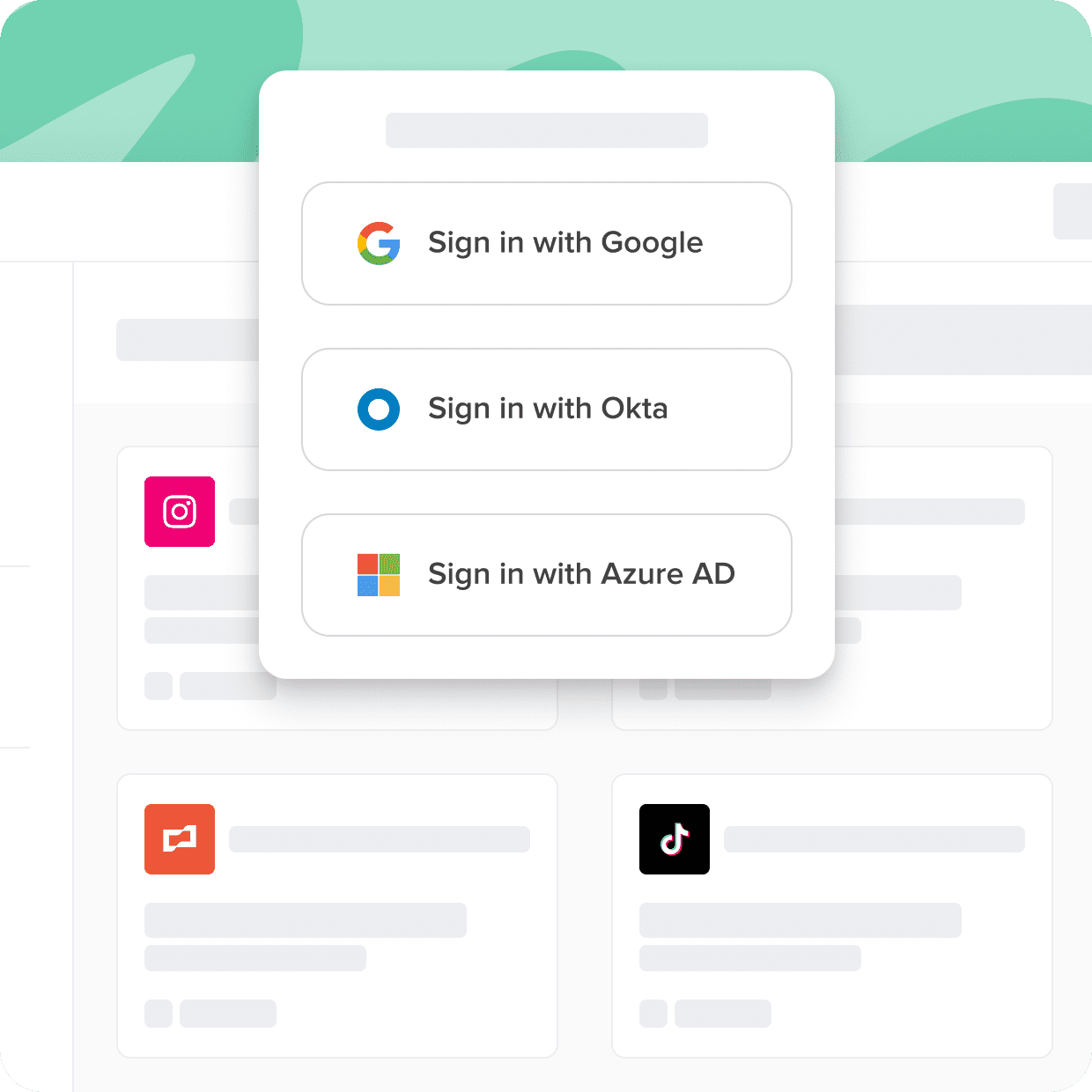SSO is a mechanism that allows users to authenticate themselves once and gain access to multiple applications or systems without the need for repetitive login processes. SSO providers offer the tools and infrastructure necessary to enable this seamless authentication experience, simplifying identity and access management for both individuals and enterprises.
Unfortunately, many corporate applications don't support the SSO standard and can't reap all the benefits. The applications that fall into this category are best called "nonfederated." Nonfederated applications are a new category that is becoming increasingly challenging for businesses to manage and secure effectively, yet increasingly critical for businesses to succeed.
Cerby connects all of your apps to your SSO tools, even if they don't support the SSO standard. In this guide, you'll learn about SSO software, the history, and the benefits.
Streamline access with single sign-on
Not all apps are created equal. Some come with security gaps and complexities that can hinder user adoption and put sensitive data at risk. With Cerby, you can ensure secure and seamless access to all your applications, regardless of their support for standards like SSO.
With Cerby you can

Close the identity gap

Universally enforce 2FA

Eliminate the SSO tax
SSO provider
In today’s digital landscape, where individuals and organizations rely on an ever-expanding array of applications and systems, managing multiple usernames and passwords can become a cumbersome and time-consuming task. This is where Single Sign-On (SSO) providers come into play, revolutionizing the way users access and manage their digital identities.
What is SSO?
At its core, SSO is a mechanism that allows users to authenticate themselves once and gain access to multiple applications or systems without the need for repetitive login processes. SSO providers offer the tools and infrastructure necessary to enable this seamless authentication experience, simplifying identity and access management for both individuals and enterprises.
With SSO, users are granted a single set of credentials, typically a username and password, which they can use to access a variety of applications and services. Instead of juggling numerous login credentials, users can authenticate themselves once and enjoy frictionless access to multiple resources within an ecosystem of connected applications.
To understand the role of SSO providers and SSO tools, consider this common single sign-on example. A user wants to access their email, Google Docs, and customer relationship management (CRM) system. Without SSO, they would need to remember and enter separate login credentials for every platform. By leveraging an SSO provider, the process becomes much more efficient. The user can authenticate themselves once, and the SSO system securely propagates their identity and authentication across all the integrated applications.
SSO solutions
As businesses and users navigate the digital landscape, SSO solutions have emerged as a game-changer, offering a range of advantages that streamline access management and enhance security. When you work with the best SSO providers, you’ll reap the following benefits:
- Simplified user experience: SSO solutions provide a seamless and user-friendly experience by eliminating the need for multiple usernames and passwords. Users can enjoy the convenience of logging in once and gaining access to multiple applications within their authorized ecosystem.
- Enhanced productivity: SSO empowers users to swiftly move between applications without the hassle of repeated logins. This streamlined access boosts productivity, enabling employees to focus on their tasks instead of dealing with authentication hurdles.
- Heightened security: In a world where cyber threats loom large, SSO solutions provide a critical layer of defense. With a staggering 2,200 cyber attacks per day and an attack occurring every 39 seconds on average, the need for robust security measures has never been more apparent. SSO solutions centralize authentication and authorization, bolstering security by implementing strong measures such as multi-factor authentication (MFA) and adaptive access policies. These safeguards ensure that only authorized users can access applications and systems, significantly reducing the risk of unauthorized access and thwarting potential data breaches.
- Reduces password fatigue: A recent survey revealed the majority of Americans deal with password fatigue by reusing passwords across multiple accounts. This habit is detrimental to cybersecurity, particularly for businesses. Implementing SSO can alleviate password fatigue and enhance the user experience while also ensuring your employees are doing their part to fight cybercrime.
- Cost and time savings: Implementing SSO delivers a positive ROI by saving time and costs. SSO streamlines authentication, improving productivity and reducing password-related tasks. SSO also eliminates the need for multiple password management systems, saving resources. For example, at Southwest Washington Medical Center, SSO paid for the project cost of $100,000 in just eight months, showcasing its rapid ROI potential.
- Relieves the burden on your help desk: Did you know that up to 34% of respondents worldwide report needing to reset their passwords around once a month? This means that your help desk agents are spending significant chunks of time helping staff reset their passwords. SSO can help with this problem because users no longer have to keep track of numerous passwords they’ll eventually forget. This reduction in password-related requests allows your help desk to allocate more time and attention to addressing critical issues and providing efficient support to users.
- Integration and compatibility: Leading SSO providers like Cerby, Okta SSO, and Google SSO offer effortless integration with various applications and platforms. This compatibility ensures that businesses can leverage their existing investments in applications while creating a secure and user-friendly environment across the enterprise ecosystem.
SSO identity provider
Choosing the right SSO identity provider (IdP) is crucial. Some of the top identity providers include:
Cerby
Cerby is an access management platform specifically designed for nonfederated applications. These applications do not support common identity and security standards such as APIs and SSO integration. Cerby addresses the challenges associated with nonfederated applications, including the inability to effectively onboard, offboard, and manage users at scale.
Okta
Okta is a leading SSO provider known for robust features and seamless integration capabilities. It offers a comprehensive identity platform supporting multi-factor authentication (MFA), social login integration, and adaptive access policies.
Microsoft Azure Active Directory (Azure AD)
Azure AD is a cloud-based identity and access management solution provided by Microsoft. It seamlessly integrates with Microsoft products and offers robust SSO capabilities, including multi-factor authentication and conditional access policies.
OneLogin
OneLogin is a user-friendly SSO provider with a scalable and secure platform. It offers various authentication options, including biometric and certificate-based authentication. OneLogin also provides centralized access management and supports multiple integration options, making it suitable for organizations of all sizes.
Identity provider vs. service provider
Understanding the difference between SSO identity provider vs. service provider is critically important. Here are some key points to keep in mind:
What is an identity provider (IdP)?
An identity provider is responsible for authenticating users and providing identity information to service providers (SPs). It acts as a trusted authority that verifies the user’s identity and provides a secure way to access various services and applications. The IdP issues authentication tokens or assertions to the SPs, allowing users to access those services without needing to provide credentials repeatedly.
Identity provider examples include Okta and Microsoft Azure Active Directory (Azure AD).
What is a service provider (SP)?
A service provider is an entity that hosts the applications or services that users want to access. It relies on the IdP for user authentication and authorization. The SP receives the authentication tokens or assertions from the IdP and grants access to the requested resources based on the provided identity information. Examples of service providers include Salesforce and Google Workspace (formerly known as G-Suite).
Identity provider vs. service provider: Uses
Identity providers are commonly used in scenarios where users need to access multiple applications or services using a single set of credentials.
Service providers are typically organizations or platforms that offer specific applications or services to users. By relying on an IdP for authentication, SPs can focus on providing their core functionality while leveraging the secure authentication infrastructure provided by the IdP.
Identity providers (IdPs) authenticate users and provide identity information to Service Providers (SPs), which host the applications or services users want to access. IdPs streamline authentication and enable users to access multiple SPs with a single set of credentials.
Open source identity and access management
Open-source solutions offer a cost-effective and flexible approach to implementing SSO and identity and access management (IAM) systems. But the benefits don’t end there. Key advantages include:
- Cost-effective: Open-source SSO providers eliminate the need for costly licensing fees, making them an attractive choice for organizations with budget constraints. The open-source nature allows for customization and adaptation to specific requirements without incurring additional costs.
- Flexibility and customization: Open-source solutions provide the flexibility to tailor the SSO system to fit an organization’s unique needs. This means you can fully customize authentication flows, integrate with existing systems, and much more.
- Transparency and security: Open-source SSO providers undergo rigorous community-driven reviews, leading to enhanced security and transparency.
Some of the best open-source SSO options include:
Keycloak
Keycloak is a highly regarded open-source identity and access management (IAM) solution that supports SSO using SAML and other protocols. It also offers seamless integration with popular identity providers and supports multi-factor authentication. It can be deployed as a self-hosted solution or used as a SaaS SSO option with Red Hat’s Keycloak Identity Platform.
Shibboleth
Shibboleth is a popular open-source SAML SSO system. It focuses on federated authentication and authorization, enabling secure access to web applications and services. Shibboleth provides a robust and scalable solution for organizations in the research and education sectors. It offers features like attribute-based access control, identity federation, and Single Logout (SLO) capabilities.
SimpleSAMLphp
SimpleSAMLphp is an open-source PHP-based SAML framework that simplifies the implementation of SAML-based SSO. It offers an easy-to-use solution for organizations seeking basic SAML authentication capabilities. SimpleSAMLphp provides comprehensive documentation, community support, and compatibility with various SAML service providers and identity providers.

